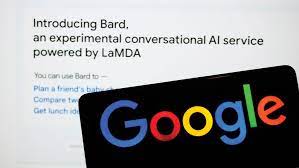Google shares lose $100 billion after company’s AI chatbot makes an error during demo

Google’s much-hyped new AI chatbot tool Bard, which has yet to be released to the public, is already being called out for an inaccurate response it produced in a demo this week.
Google’s much-hyped new AI chatbot tool Bard, which has yet to be released to the public, is already being called out for an inaccurate response it produced in a demo this week.
In the demo, which was posted by Google on Twitter, a user asks Bard: “What new discoveries from the James Webb Space Telescope can I tell my 9 year old about?” Bard responds with a series of bullet points, including one that reads: “JWST took the very first pictures of a planet outside of our own solar system.”
According to NASA, however, the first image showing an exoplanet — or any planet beyond our solar system — was actually taken by the European Southern Observatory’s Very Large Telescope nearly two decades ago, in 2004.
Shares in Google’s parent company Alphabet fell 7.7% Wednesday, wiping $100 billion off its market value, after the inaccurate response from Bard was first reported by Reuters.
Bard’s blunder highlights the challenge for Google as it races to integrate the same AI technology that underpins Microsoft-backed ChatGPT into its core search engine. In trying to keep pace with what some think could be a radical change spurred by conversational AI in how people search online, Google now risks upending its search engine’s reputation for surfacing reliable information.
Like ChatGPT, Bard is built on a large language model, which is trained on vast troves of data online in order to generate compelling responses to user prompts. Experts have long warned that these tools have the potential to spread inaccurate information.
In an apparent attempt to address that concern, Google previously said Bard would first be opened up to “trusted testers” this week, with plans to make it available to the public in the coming weeks.
“This highlights the importance of a rigorous testing process, something that we’re kicking off this week with our Trusted Tester program,” a Google spokesperson told CNN in a statement Wednesday about the factual error. “We’ll combine external feedback with our own internal testing to make sure Bard’s responses meet a high bar for quality, safety and groundedness in real-world information.”
Shares for Google-parent Alphabet fell as much as 8% in midday trading Wednesday after the inaccurate response from Bard was first reported by Reuters.
Google’s much-hyped new AI chatbot tool Bard, which has yet to be released to the public, is already being called out for an inaccurate response it produced in a demo this week.
In the demo, which was posted by Google on Twitter, a user asks Bard: “What new discoveries from the James Webb Space Telescope can I tell my 9 year old about?” Bard responds with a series of bullet points, including one that reads: “JWST took the very first pictures of a planet outside of our own solar system.”
According to NASA, however, the first image showing an exoplanet — or any planet beyond our solar system — was actually taken by the European Southern Observatory’s Very Large Telescope nearly two decades ago, in 2004.
Shares in Google’s parent company Alphabet fell 7.7% Wednesday, wiping $100 billion off its market value, after the inaccurate response from Bard was first reported by Reuters.
Bard’s blunder highlights the challenge for Google as it races to integrate the same AI technology that underpins Microsoft-backed ChatGPT into its core search engine. In trying to keep pace with what some think could be a radical change spurred by conversational AI in how people search online, Google now risks upending its search engine’s reputation for surfacing reliable information.
Like ChatGPT, Bard is built on a large language model, which is trained on vast troves of data online in order to generate compelling responses to user prompts. Experts have long warned that these tools have the potential to spread inaccurate information.
In an apparent attempt to address that concern, Google previously said Bard would first be opened up to “trusted testers” this week, with plans to make it available to the public in the coming weeks.
“This highlights the importance of a rigorous testing process, something that we’re kicking off this week with our Trusted Tester program,” a Google spokesperson told CNN in a statement Wednesday about the factual error. “We’ll combine external feedback with our own internal testing to make sure Bard’s responses meet a high bar for quality, safety and groundedness in real-world information.”
Shares for Google-parent Alphabet fell as much as 8% in midday trading Wednesday after the inaccurate response from Bard was first reported by Reuters.